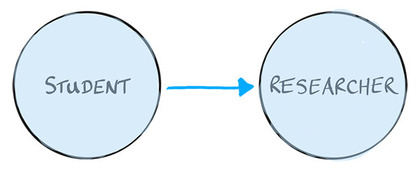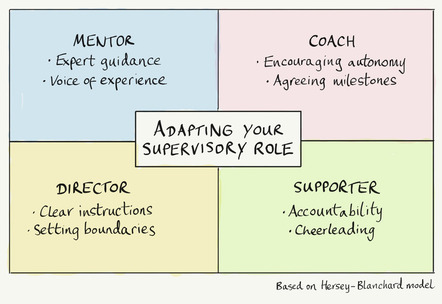When you start a PhD, you’ve probably emerged from a taught programme, such as an undergraduate or Masters’ degree. At that level, you’re used to a lot of structure and explicit deadlines. As a doctoral researcher, though, you need to leave behind that student identity and become independent. This means assuming more responsibility as the PhD progresses. That’s the only way you can make and defend an original and significant contribution to knowledge.

The supervisory relationship needs to shift as you make that transition from student to independent researcher. Problems occur when either the student wants to remain dependent, or the supervisor is keen to exert too much control.
The Hersey-Blanchard Model of Situational Leadership is helpful for understanding how the supervisory relationship adapts during the PhD. The four quadrants show the different roles your supervisor might inhabit:

Director – at the beginning, you need clear direction to get yourself on the right path. You have no idea what’s going on! Your supervisor is setting boundaries for the working relationship and communicating expectations. If you’re lab-based, they’re also making sure you don’t harm yourself or other people with lethal equipment or potions.
Mentor – once you’ve orientated yourself, your supervisor needs to give you more latitude. They’re now the voice of experience (e.g. “You can’t read everything that was ever published on this topic. I know, because I tried”), but you should be allowed to make your own mistakes (unless it’s with one of those lethal potions). They should also prompt you on key milestones, such as applying for ethical approval, making sure you understand what’s involved.
Coach – by the time you’ve gained some momentum, you should become more independent – e.g. making your own decisions and finding solutions to problems. Your supervisor provides encouragement by flagging milestones and agreeing priorities, but they’re no longer directing you. Coaches help clients to harness their own inner resources – they don’t tell them the answers.
Supporter – in the final year of their PhD, you’ll be an expert on your research project, even if your supervisor knows more about the wider context. You’re preparing to defend a thesis and need to take full responsibility for it. Your supervisor won’t be part of the examination process. By this stage, enthusiasm and energy are waning, so you need them to provide both accountability and moral support.
Inevitably, this is a simple model and doctoral progression is seldom straightforward. However, the ability to adapt your role is vital. You might need to revert to an earlier role, for example, if you return after a long absence or suffer a significant setback. Once you’re back on track, you can restart the transition. As this is a model for situational leadership, you also need to consider the stage of your PhD. Although you might have achieved a high level of autonomy when working on your literature review, you still need a lot of direction when beginning your fieldwork.
Consider where you are on this model, and also where you should be. If you think your supervisor is trapping you in the wrong quadrant, it’s time for a chat. Ask them where they think you should be at this stage. If you’re not quite there, what needs to happen? What would they need to see before granting you more autonomy. Ultimately, your supervisor is successful if you no longer need them (you might want to find a diplomatic way of telling them that).
The supervisor’s role is often implicit — it’s assumed that both they and you understand their responsibilities, even though those responsibilities aren’t fully documented. While they’re not trying to obstruct you, the lack of clarity around the role means they sometimes unwittingly place obstacles in your way. Often this is due to a lack of communication. By taking the initiative in managing the supervisory relationship, you can ensure that expectations are both explicit and reasonable. With some effort, you can achieve a positive outcome for everyone.
This content is adapted from my book How to Finish Your PhD. I also run a workshop on Working with Your PhD Supervisor.